|
|
|
Sort Order |
|
|
|
Items / Page
|
|
|
|
|
|
|
| Srl | Item |
| 1 |
ID:
140965
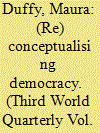

|
|
|
|
|
| Summary/Abstract |
The 21st century has witnessed increasing dissatisfaction with existing democratic institutions and processes and the growth of alternatives to representative democracy. At the same time arguments are emerging that conventional standards for evaluating democracy are ‘out of touch’ with current realities; in particular, with popular understandings, experiences and aspirations of what democracy should look like. This paper draws on empirical research in Caracas, Venezuela into how Venezuelan people understand democracy, in order to build a case that current evaluatory benchmarks are inadequate for understanding complex processes of social change based on more direct and participatory forms of democratic engagement.
|
|
|
|
|
|
|
|
|
|
|
|
|
|
|
|
| 2 |
ID:
096572


|
|
|
|
|
| Publication |
2010.
|
| Summary/Abstract |
Foreign aid involves a chain of accountability relationships stretching from international donors through national governments and implementing agencies to a set of ultimate end users of the goods and services financed by the aid. In this paper, I review five different accountability relationships that exist in foreign aid projects among donors, governments, implementing agencies and end users. Then I summarize existing empirical evidence demonstrating that foreign aid functions better-both at the macro-level of aid flows and at the micro-level of individual aid projects-when there is more government and implementing agency accountability. Specifying several mechanisms that facilitate accountability, I emphasize that participation is a tool often used to produce accountability within aid projects. However, in terms of donor accountability to aid-receiving countries and the end users in them, recent pushes for increased participation have not resulted in more accountability in the design of aid programs. Ultimately, although enthusiasm for participatory models of aid design and delivery is warranted, participation is not a panacea for all the accountability problems in foreign aid programs.
|
|
|
|
|
|
|
|
|
|
|
|
|
|
|
|
| 3 |
ID:
120357
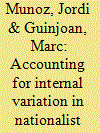

|
|
|
|
|
| Publication |
2013.
|
| Summary/Abstract |
Between September 2009 and April 2011, around one-half of the Catalan municipalities held unofficial referendums on independence from Spain, in which more than 800,000 citizens took part. However, the participation rates were unevenly distributed across Catalonia. In this paper, using an original data set, we aim to respond to two relevant questions: first, why in some municipalities the referendum took place and in others it did not occur. Second, why did the referendum achieve high rates of turnout in some localities and much lower participation in others. We find that the resources available to the movement, the intensity of the mobilization efforts, the participatory tradition of the municipalities and the size of the nationalist 'sentiment pool' in each locality explain to a great extent the internal variation in nationalist mobilization in Catalonia.
|
|
|
|
|
|
|
|
|
|
|
|
|
|
|
|
| 4 |
ID:
193483


|
|
|
|
|
| Summary/Abstract |
Scholarship on global environmental assessments call for these organisations to become more reflexive to address challenges around participation, inclusivity of perspectives, and responsivity to the policy domains they inform. However, there has been less call for reflexivity in IPCC scholarship or closer examination of how routine concepts condition scholarly understanding by focusing on science and politics over other social dynamics. In this article, I suggest that scholarly reflexivity could advance new analytical approaches that provide practical insights for changing organisational structures. Through reflecting on my understanding of the IPCC, I develop actors, activities, and forms of authority as a new analytical framework for studying international organisations and knowledge bodies. Through its application, I describe the social order of the IPCC within and between the panel, the bureau, the technical support units, the secretariat and the authors, which is revealing of which actors, on the basis of what authority, have symbolic power over the writing of climate change. The fine-grained analysis of organisations enabled by this analytical framework reveals how dominance can and is being remade through intergovernmental relations and potentially, identifies avenues that managers of these bodies can pursue to challenge it.
|
|
|
|
|
|
|
|
|
|
|
|
|
|
|
|
| 5 |
ID:
157714
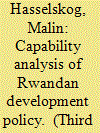

|
|
|
|
|
| Summary/Abstract |
This article provides a capability analysis of Rwandan development policy. It is motivated by impressive progress on human development indicators in combination with highly centralised policymaking, giving ambiguous signs regarding a capability approach. It is based on extensive original empirical material, along with large numbers of official documents and academic sources. The analysis is structured around three issues that concern the relation between individual agency and government policy, and that are debated among capability scholars as well as in relation to Rwandan development policy: participation, transformation and paternalism. The finding that Rwandan development policy reflects an approach very different from a capability approach is not surprising, but establishes that the assumed link between human development indicators and the capability approach needs to be questioned. This brings our attention to shortcomings in any quantitative measurements of development, or in the use of and importance attached to them, as well as to the problem of assuming that certain outputs go hand in hand with certain processes. While this is valid for contexts far beyond Rwanda, it also sheds light specifically on the polarisation that exists in the scholarly debate on Rwanda
|
|
|
|
|
|
|
|
|
|
|
|
|
|
|
|
| 6 |
ID:
133723
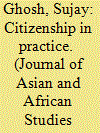

|
|
|
|
|
| Publication |
2014.
|
| Summary/Abstract |
Citizenship is essentially about membership in society which enables citizens to participate in the affairs of their community on roughly equal terms and culturally enjoins upon them to collectively surmount their commonly felt problems, such as poverty. The role of Self-Help Groups (SHGs) should be understood in this context. Through observation and conversation-analysis methods, this paper studies two SHGs in India: the successful one practiced citizenship, envisaged a sense of community and made progress towards capacity building and empowerment, especially pertaining to education, health and sanitation. It concludes that in developing countries, citizens acquire the appropriate virtues through participation in the programmes linked with their vision of well-being and thus strengthen the cause of citizenship.
|
|
|
|
|
|
|
|
|
|
|
|
|
|
|
|
| 7 |
ID:
156083
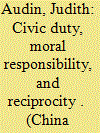

|
|
|
|
|
| Summary/Abstract |
This paper, which is based on ethnographic field research, analyses the system of resident-volunteers in the neighbourhoods of Beijing. Between co-optation networks, surveillance missions, ritualised practices, and ordinary exchanges of sociability amongst neighbours, volunteering is an interesting form of citizen participation in urban China. The volunteer networks are made up of inhabitants who are selected and involved through the norms of civic duty, personal acquaintance, moral obligation, or persuasion, in order to contribute to the production of local public order. Finally, this specific form of voluntarism reveals, from the perspective of retired people, how shared socio-political practices are created and perpetuated within an institutional volunteering system.
|
|
|
|
|
|
|
|
|
|
|
|
|
|
|
|
| 8 |
ID:
138082
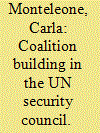

|
|
|
|
|
| Summary/Abstract |
Political coalitions in the international system are still understudied in International Relations theory. This article claims that the formation of and variations in coalitions in the international system are affected by changes in their bargaining power and bargaining environment related to the global leadership cycle and by long-term organisational changes of the international political system. Identifying the Security Council as the institution in which states are more likely to keep their systemic preferences at the institutional level, the article studies the presence, formation and change of coalitions in the international system by testing variations in the behaviour of the Security Council members in the period 1993–2012. To overcome methodological difficulties, it proposes to analyse sponsoring rather than voting behaviour. In the analysed period, the presence of a mutating dominant coalition, signs of potential coalitions in the making and an increase in participation and competition resulting from modifications in the organisational form of the international system are found.
|
|
|
|
|
|
|
|
|
|
|
|
|
|
|
|
| 9 |
ID:
187599
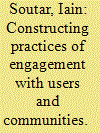

|
|
|
|
|
| Summary/Abstract |
Energy transitions require engagement with users, local communities and wider publics in order to be fair, acceptable and, ultimately, successful. Here we focus on the development of decentralised energy systems instigated by central government. Smart Local Energy Systems (SLES), involving low carbon generation, demand sources and smart technologies in a geographically-bounded location, are important but unexplored contexts for public engagement. Drawing on 23 interviews with partner organisations in 12 UK SLES projects, we investigate the targets, methods and rationales of engagement. Partners engage a range of user and community groups around multiple energy system components using a variety of methods, directly and via intermediary organisations. Project size is not a major influence on breadth and intensity of engagement. Project partners rationalise practices with reference to characterisations of users and engagement, and practices are conditioned by a range of factors (e.g. technological boundaries, place, partners involved, and the wider organisational context within which SLES projects take place). We highlight a need for future SLES policy to emphasise engagement as a key facet, institute systematic social learning between SLES projects, and consider how to engage publics beyond the boundaries of individual projects.
|
|
|
|
|
|
|
|
|
|
|
|
|
|
|
|
| 10 |
ID:
102682
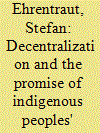

|
|
|
|
|
| Publication |
2011.
|
| Summary/Abstract |
Indigenous peoples' rights, including the right to self-determination, are increasingly codified in international law and policy and disseminated globally by international organizations. These norms mark a profound change in the ideals of citizenship promoted by the international community, away from linguistically and institutionally homogenous citizenship in centralized states to group-differentiated citizenship in decentralized, multi-level and multi-lingual states that use local and regional autonomy for the accommodation of indigenous peoples. Essential to realizing these norms is the devolution of some degree of autonomy to sub-central state units substantially controlled by indigenous communities. Because the transfer of powers to indigenous peoples is crucial to their accommodation, protection and participation in modern states, and because decentralization programs are an important component of reform agendas in most developing countries, it is important to understand how these emerging norms are integrated into real-world decentralization processes.
This article analyzes the application of the World Bank's safeguards policy for indigenous peoples within the institution's support to decentralization reform in Cambodia. The analysis demonstrates that under certain circumstances, the policy not only fails to translate into effective protection but leads to outcomes diametrically opposed to its objectives. In its current design, Bank support to decentralization contributes to the marginalization of indigenous peoples in Cambodia and undermines the institutional, cultural and natural resources upon which their empowerment and participation depends. In environments in which full compliance might be unrealistic to accomplish by individual projects, safeguard obligations lead to a strategy on the part of Bank projects of avoiding geographical and policy areas that are likely to trigger the safeguards policy, in order to reduce projects' vulnerability to non-compliance claims. The article discusses how more effective application of the safeguards policy might be achieved and how strategies for the empowerment of indigenous peoples can more effectively draw on decentralization frameworks.
|
|
|
|
|
|
|
|
|
|
|
|
|
|
|
|
| 11 |
ID:
094485
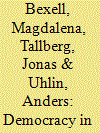

|
|
|
|
|
| Publication |
2010.
|
| Summary/Abstract |
The participation of transnational actors in global policymaking is increasingly seen as a means to democratize global governance. Drawing on alternative theories of democracy and existing empirical evidence, we assess the promises and pitfalls of this vision. We explore how the structuring and operation of international institutions, public-private partnerships, and transnational actors themselves may facilitate expanded participation and enhanced accountability in global governance. We find considerable support for an optimistic verdict on the democratizing potential of transnational actor involvement, but also identify hurdles in democratic theory and the practice of global governance that motivate a more cautious outlook. In conclusion, we call for research that explores the conditions for democracy in global governance through a combination of normative political theory and positive empirical research.
|
|
|
|
|
|
|
|
|
|
|
|
|
|
|
|
| 12 |
ID:
166144


|
|
|
|
|
| Summary/Abstract |
Little attention has been given to understanding how international courts feature in legitimacy assessments. How should the performance of international courts be evaluated in terms of their effect on a democratic deficit in international lawmaking? This article takes an initial step toward understanding how international courts improve or weaken the presence of democratic values in international lawmaking. In particular, this article focuses on one aspect of international courts—access for transnational actors. This article argues that TNA access to international courts provides an institutional mechanism to advance participation and transparency in international lawmaking. Normative and empirical analysis are combined to illustrate the extent to which access applies to international courts. Based on the empirical findings, which show a marked increase in TNA access to international courts, I argue that the increased participation and transparency made available through TNA access have democratizing effects on international lawmaking.
|
|
|
|
|
|
|
|
|
|
|
|
|
|
|
|
| 13 |
ID:
163744
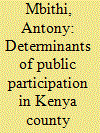

|
|
|
|
|
| Summary/Abstract |
The Constitution of Kenya 2010 introduced a framework for devolving public resources in Kenya’s forty-seven Counties. The Counties were given the responsibilities of maintaining health, roads and agriculture, among others. Using the Afrobarometer (2015) survey, we employ probit regression to examine the determinants of successful public participation in the Counties. We find that approval of the Governor’s performance has a positive and significant influence on public participation. However, difficulty among the citizenry in influencing County decision-making; lack of responsive County Assembly Members; difficulty in accessing information on County budgets, legislation and projects; and corruption in the Governor’s office have a negative significance.
|
|
|
|
|
|
|
|
|
|
|
|
|
|
|
|
| 14 |
ID:
113959
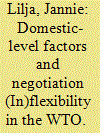

|
|
|
|
|
| Publication |
2012.
|
| Summary/Abstract |
Some suggest that the fault lines of the WTO's perceived failures actually lie in failures at the domestic level. This study examines the factors that can explain flexibility (and inflexibility) in multilateral trade negotiations within WTO member states. To shed light on the role of domestic factors in influencing WTO positions, we examine one member state in connection with a high-level meeting. India at the July 2008 Ministerial is selected primarily for methodological reasons. The empirical analysis provides preliminary support for the proposition that domestic policy-making structures marked by continuous information exchange and coordination are more likely to yield negotiation flexibility in multilateral talks. More specifically, the intense interaction that marks the relationships between actors involved in policy making on Non-Agricultural Market Access (NAMA) and services, where the Indian negotiation position was flexible overall, stands in contrast to what took place in the area of agriculture, where India took a manifestly inflexible stand. Competing explanations fail to fully account for the variation in these negotiating postures. A key insight from the analysis is that organized and regularized consultations, involving the same actors over time, are important. There is also a need for public outreach strategies in connection with high-level WTO meetings.
|
|
|
|
|
|
|
|
|
|
|
|
|
|
|
|
| 15 |
ID:
114600


|
|
|
|
|
| Publication |
2012.
|
| Summary/Abstract |
International donors to Bangladesh have emphasized governance reform since the 1990s, on the basis that bad governance was siphoning away both domestic and foreign aid resources. While donor support towards good governance is encouraging, such support should be judged in the light of actual contributions to the promotion of good governance. This article examines a donor-funded project called the Participatory Rural Development Project (PRDP), which aims to promote good governance at the grassroots level. The article assesses the effectiveness of PRDP in promoting good governance, especially in bringing transparency and accountability to Bangladeshi Public Administration. The core finding is that the project achieved remarkable success, with a tangible impact in terms of promoting good governance at the local level. The paper analyzes the reasons for this success with the aim of providing indicators for other donors working in this area.
|
|
|
|
|
|
|
|
|
|
|
|
|
|
|
|
| 16 |
ID:
158032
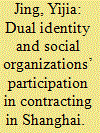

|
|
|
|
|
| Summary/Abstract |
Chinese governments, driven by both pragmatic and legitimacy purposes, have been enthusiastically engaging social organizations in service contracting to meet rising service demands. This article argues that social organizations’ participation in contracting is shaped by their dual identity as state agents and social actors. Such a dual identity is forged by China’s institutional environment and its internal tension may create both incentives and disincentives for contracting. Using the data from the competitive contracting for the social service program in Shanghai (2009–2013), the article finds intriguing evidence that both identities had positive influences on social organizations’ participation. Social organizations actively participated to demonstrate loyalty and manage their relations with government, as well as to seek new resources, social visibility and professional capacities. They reconciled the two identities by adopting multiple strategies. Further analysis reveals how contracting has been adapted to the social-administrative system in China.
|
|
|
|
|
|
|
|
|
|
|
|
|
|
|
|
| 17 |
ID:
165668
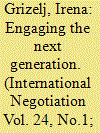

|
|
|
|
|
| Summary/Abstract |
Literature examining the participation of youth during peace processes is limited. Previous work has often focused on youth as “peacebuilders” and agents of change or threats to peace in the post-accord period, with little emphasis on how young people participate during the negotiation phase. This article seeks to fill this gap by assessing youth inclusion and participation in Myanmar’s ongoing peace negotiations. The study finds that, while youth have not had formal inclusion avenues in the peace negotiations, there are cohorts of young people who perceive themselves to be legitimate stakeholders in the peace process, who have attempted to gain access to decision-making in the peace negotiations, and have played active roles in supporting the process. It is argued that recognizing youth as key stakeholders in the peace accord will play a vital role in building sustainable peace within Myanmar’s nascent democracy.
|
|
|
|
|
|
|
|
|
|
|
|
|
|
|
|
| 18 |
ID:
193912


|
|
|
|
|
| Summary/Abstract |
This study aims to fill this gap by examining the Filyos Valley Project in terms of a governance approach. Based on semi-structured elite interviews, it concludes that the Filyos Valley Project was superficially conducted in line with the governance perspective but did not include a meaningful governance approach. The reasons are the decisive position of the central government, the discovery of natural gas in the region, the influence of political rivalry, insufficient efforts to address the stakeholders’ concerns, and the lack of feedback from the central.
|
|
|
|
|
|
|
|
|
|
|
|
|
|
|
|
| 19 |
ID:
112799


|
|
|
|
|
| Publication |
2012.
|
| Summary/Abstract |
This paper examines Indonesia's democratic state capacity-building in terms of transformations in West Timor, particularly around manganese mining. It is structured on the basis of three complementary sets of arguments. Firstly, democratic capacity-building is essentially a power-driven process as it seeks to re-arrange the way in which power is distributed. This process is shaped by the relative capabilities of a variety of societal interests struggling to dominate the control of state power at multiple sites of a highly competitive 'field of power'. Secondly, Indonesia's democratic decentralisation experience has produced uneven results, both between and within provinces. This is largely because the dynamic of the reform process is determined by the relative capabilities of competing social forces to engage in the political landscape and influence revenue generation and resource management policies. Thirdly, manganese mining, which has recently emerged as a quick method of revenue generation in resource-poor West Timor, provides an important case study that reflects the structural dynamics of state (in)capacity.
|
|
|
|
|
|
|
|
|
|
|
|
|
|
|
|
| 20 |
ID:
101437


|
|
|
|
|
| Publication |
2010.
|
| Summary/Abstract |
Community energy initiatives offer a potentially important means for reshaping the electrical system in a manner compatible with emissions reduction goals. Many such initiatives, however, focus upon top-down, institutionally structured approaches that understand community residents as atomistic, economically motivated, and minimally engaged. This paper examines a number of case studies that are based upon a bottom-up approach rooted in a civic culture that seeks to maximize the capacities of an active and engaged citizenry. The paper focuses upon two mutually dependent issues: first, recruiting community members, and second, sustaining their participation.
|
|
|
|
|
|
|
|
|
|
|
|
|
|
|
|
|
|
|
|
|